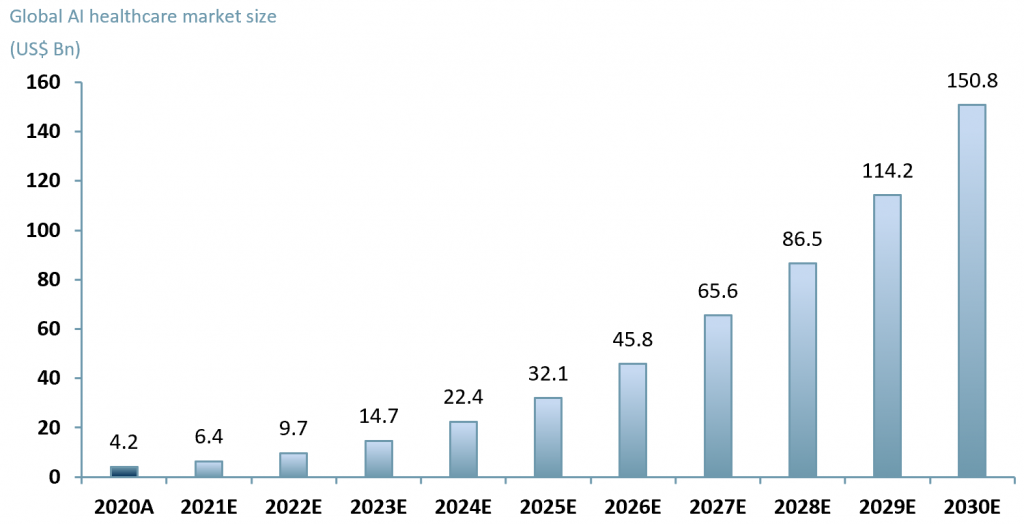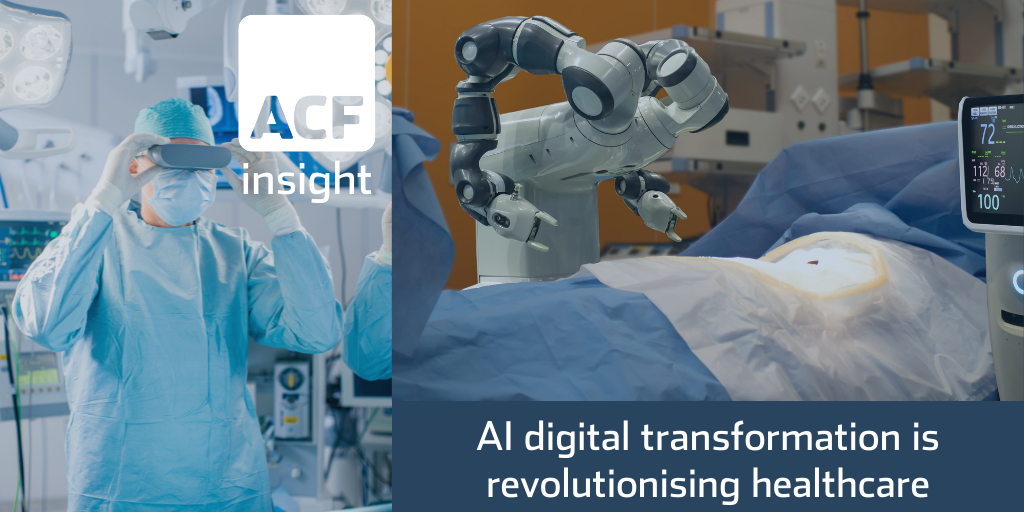AI: The Future of Healthcare
Guy’s and St Thomas’ NHS Foundation Trust in the UK will integrate AI solutions as part of its digital transformation, as announced by Nuance in April 2021. AI will help increase positive patient outcomes.
- Guy’s and St Thomas’ will incorporate Nuance Communications’ (NASDAQ: $NUAN) Nuance® Dragon® Medical One speech recognition technology into its Epic Electronic Health Record software (Epic EHR).
- Nuance is a speech-recognition specialist company founded in 1992. Nuance also builds chatbots, voice-based authentication technology and offers tools for monitoring call centre conversations – essential AI and digital transformation tools.
- According to Nuance’s latest report and accounts (FYE20A), its AI digital transformation solutions are used by over 550k clinicians and 10k healthcare organisations globally.
- Microsoft (NasdaqGS: $MSFT) announced its plan to acquire Nuance for US$ 16bn last month. ACF’s investment research team infer that such an acquisition signals the expansion and acceleration of applied AI digital transformation in healthcare.
- In 2020, global spending on AI technology reached US$ 50bn. IDC’s (International Data Corporation) August 2020 report forecasts that AI spend will increase by ~US$ 60bn by 2024.
- AI digital transformation in healthcare, in our view, will drive a complete restructuring of healthcare systems around the world.
- Developing economies with poor or non-existent healthcare systems will likely jump straight to AI digital, in the same way they moved to digital banking without going through the ubiquitous bricks and mortar distribution networks of the ultra-developed economies.
- The benefits of AI digital transformation, apart from the ease of cross-referencing data easily, cheaply, quickly and in huge volumes that will lead to more efficacious protocols, is saving medical administrative and travel time.
- Saving medical administrative and travel time means more time for medical assessment and treatment rather than recording, searching and travelling.
- In developing nations, where highly trained medical professionals are a rare resource, this is a critical advantage leading to better population healthcare and so faster overall economic development.
- Ultra-developed economies are facing an unfavourable demographic (aging populations). Cost efficiencies available to such nations must be grasped with enthusiasm in order to stand any fiscal chance of maintaining affordability for free at point of use healthcare systems. For ultra-developed nations this, ultimately, is about political stability as much as it is about maintaining economic productivity and competitive advantage.
Why AI in Healthcare?
The healthcare sector is facing a radical and rapid transformation and AI digital transformation is the driving factor. There is increasing interest in biotech companies from what once would have been deemed unlikely quarters – tech giants such as $MSFT, Google (NasdaqGS: $GOOG) and Amazon (NasdaqGS: $AMZN) are investing in services for the sector, and possibly even in the sector. The investing activities of tech giants in turn signals to markets that these companies are preparing for a boom and inevitable expansion of AI digital transformation in healthcare.
Improvements to care protocols, data storage and clinician-patient communication have increased significantly, perhaps even dramatically, since the pandemic started.
ACF’s research suggests that telemedicine and telehealth are going to be the new normal for everyday medical consultations. Telehealth is a margin challenge for hospitals but it also has several beneficial aspects:
- It reduces the existing pressure on healthcare personnel by eliminating the need for physical paper trails, i.e. everything becomes digital
- It enables a larger number of patient consultations and fewer unnecessary in-person visits
- It eliminates the mobility and distance issues for those unable to get to medical care facilities
- It protects both healthcare professionals and patients from exposure to additional infections
- It reduces financial demands for those paying for the services – governments and insurers – leading to either better, or more affordable healthcare for a greater proportion of a population, which in turn leads to greater productivity and greater wealth creation in the economy.
AI digital transformation solutions offered by companies such as $NUAN, (soon to become part of $MSFT) offer additional opportunities for the healthcare sector. By facilitating data capture solutions and increasing the quality and accuracy of patients’ data, Nuance is, almost inevitably, helping to improve the quality life of >300m patients each year (FT).
The digitalisation of data processes in healthcare will remove an administrative burden, leaving healthcare professionals with more time to devote to the job they are expensively trained for – patient care.
Nuance’s software is said to help clinicians produce documentation >45x faster (FT) than manual/physical paper processes.
The demand for AI digital transformation software is here to stay and the market is lucrative for AI providers. The healthcare sector has been behind the curve in terms of AI digital transformation – this in turn is good for investors who can look forward to a further wave of healthcare sector value generation.
The future value of the AI Healthcare Market
Since 2019 we have seen AI innovations introduced in many areas of the healthcare sector including UV-C cleaning robots, care (robotic nurses and monitoring AI), robotic surgeons and AI augmented treatments and R&D (e.g. Covid vaccine development).
As new strains of Covid continue to emerge around the globe, R&D will remain a focus. With AI advancements new and better vaccines can emerge in weeks rather than months, or as it was before Covid, years.
Given the speed of the AI healthcare transition driven by the Covid-19 pandemic, growth in the healthcare market will remain strong and generate numerous read-through investment opportunities from existing and new businesses providing the healthcare market with AI digital transformation services and products.
In exhibit 1 below, we forecast that the global AI market will reach ~US$ 151bn by 2030E at an overall CAGR of 43% (more conservative than the market consensus).
In phase 1, our growth rate is 52% – we assume an initially high growth rate as large cap tech companies such as Microsoft (NASDAQ: $MSFT), Google (NASDAQ: $GOOG), Amazon (NASDAQ: $AMZN), IBM (NYSE: $IBM) and NVIDIA (NASDAQ: $NVDA) invest heavily on the back of the Covid- 19 pandemic and their products and services rapidly penetrate the healthcare sector.
In phases 2 and 3, the rate decelerates as the market matures and new areas in which AI technologies can be applied become more difficult to penetrate. In short, we assume that this particular market segment will saturate over a decade and become a cash cow for the companies that establish either niche or significant market shares.
Exhibit 1 – Global AI healthcare market forecast 2020A-2030E
 Sources: ACF Equity Research Estimates; Market Data; Research and Markets; BIS Research.
Sources: ACF Equity Research Estimates; Market Data; Research and Markets; BIS Research.
Exhibit 2 shows a peer group of companies in AI & IT offering software solutions for the healthcare sector: Nuance (NASDAQ: $NUAN), BioMerieux ($BIM: Euronext), Craneware (AiM : $CRW.L) HealthLynked (OTCQB: $HLYK) and Diaceutics (AIM: $DXRX.L).
Exhibit 2 – Peer group of Healthcare care IT & AI companies offering software solutions in the healthcare sector
 Source: ACF Equity Research Graphics. Exchange rate: (Source: XE.com) EUR vs USD 1.20091 GBP vs USD 1.38984
Source: ACF Equity Research Graphics. Exchange rate: (Source: XE.com) EUR vs USD 1.20091 GBP vs USD 1.38984
Authors: Anne Castagnede and Anda Onu, Anne leads the Sales & Strategy Team at ACF Equity Research, Anda is also part of ACF’s Sales & Strategy team. See their profiles here
















